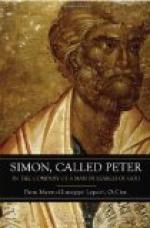It transpired that he was slightly late: the Bishop had been speaking. He was a good Bishop and eloquent, and, as the A.C.G. who now rose to take the matter in hand remarked, he had struck the right note. In all probability it was due to Peter’s having missed that note that he was so critical of the scheme. The note would have toned him up. He would have felt a more generous sympathy for the lads in the field, and would have been more definitely convinced that something must be done. If not plainly stated in the Holy Scriptures, his lordship had at least found it indicated there, but Peter was not aware of this. He only observed that the note had made everyone solemn and intense except the Labour member. That gentleman, indeed, interrupted the A.C.G. before he was fairly on his legs with the remark: “Beggin’ your pardon, sir, but as this is an informal conference, does anyone mind if I smoke?"...
Peter’s A.C.G. was anything but a fool, and the nightmare from Headquarters had genuinely communicated itself to him. He felt all he said, and he said it ably. He lacked only in one regard: he had never been down among the multitude. He knew exactly what would have to have been in his own mind for him to act as he believed some of them were acting, and he knew exactly how he would, in so deplorable a condition of affairs, have set about remedying it. These things, then, he stated boldly and clearly. As he proceeded, the Y.M.C.A. ladies got out notebooks, the Professor allowed himself occasional applause, and the Labour member lit another pipe.
It appeared that there was extreme unrest and agitation among the troops, or at least a section of the troops, for no one could say that the armies in the field were not magnificent. They had got to remember that the Tommy of to-day was not as the Tommy of yesterday—not that he suffered by comparison, but that he was far better educated and far more inclined to think for himself. They were well aware that a little knowledge was a dangerous thing, or, again, as his friend the Bishop would have doubtless put it, how great a matter a little fire kindleth. There was no escaping it: foreign propaganda, certain undesirable books and papers—books and papers, he need hardly say, outside the control of the reputable Press—and even Socialistic agitators, were abroad in the Army. He did not wish to say too much; it was enough to remind them of what, possibly, they already knew, that certain depots on certain occasions had refused to sing the National Anthem, and were not content with their wages. Insignificant as these things might be in detail, G.H.Q. had felt there was justifiable cause for alarm. This meeting had gathered to consider plans for a remedy.
Now he thanked God that they were not Prussians. There must be no attempt at coercion. A war for liberty must be won by free people. One had, of course, to have discipline in the Army, but theirs was to-day a citizen Army. His friend who had left his parliamentary duties to visit France might rest assured that the organizations represented there that morning would not forget that. In a word, Tommy had a vote, and he was entitled to it, and should keep it. One day he should even use it; and although no one could wish to change horses crossing a stream, still, they hoped that day would speedily come—the day of peace and victory.




